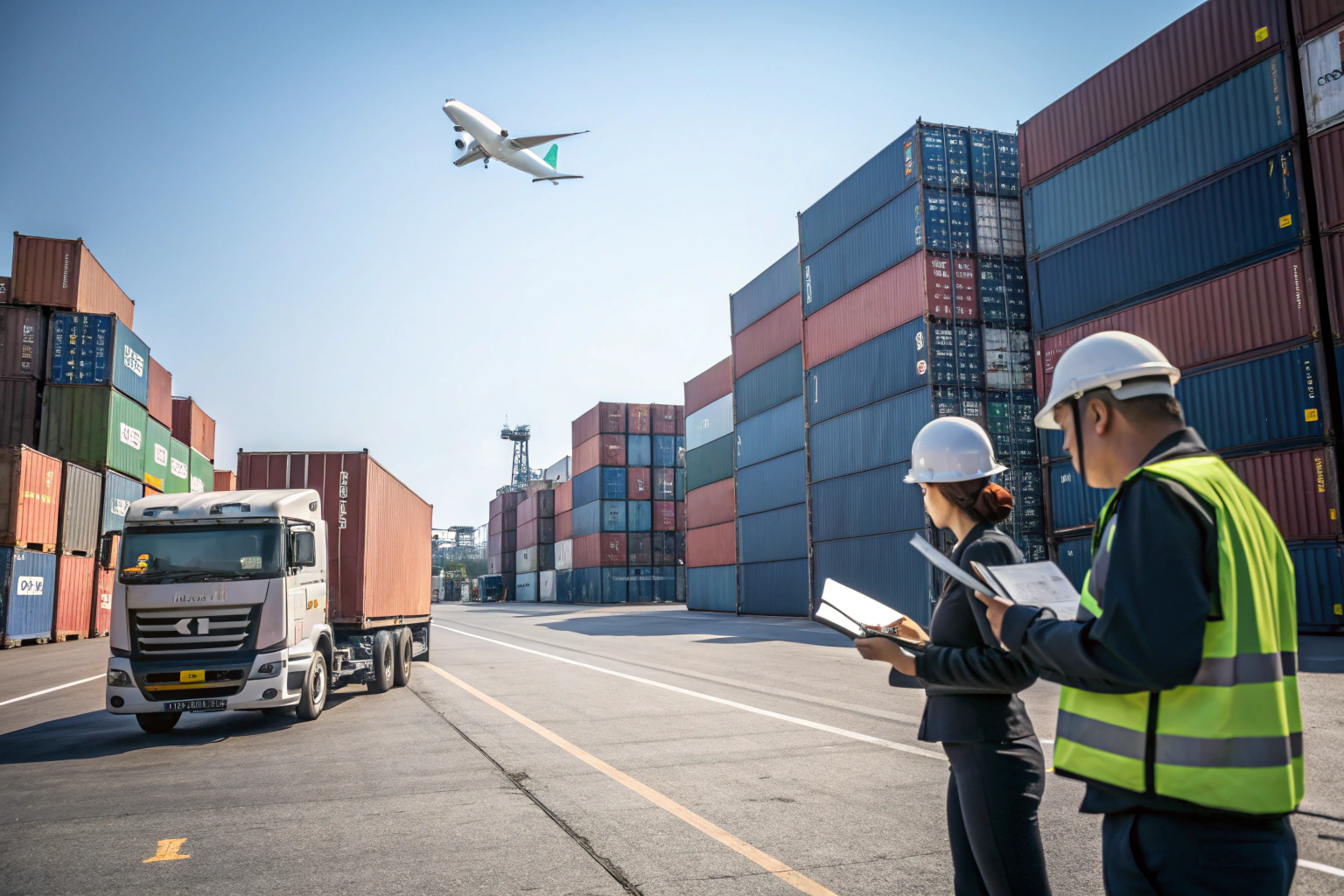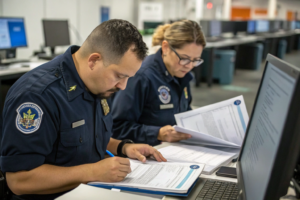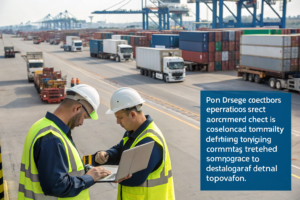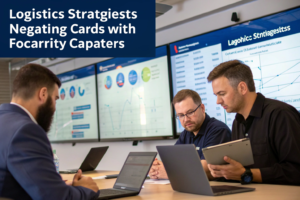Freight forwarding is one of the most important links in global trade. If you are a business owner, you might be wondering how your goods can move smoothly across international borders when every country has its own customs and regulations. Without proper planning, cross-border shipments can face delays, fines, or even confiscation. These risks can hurt supply chains and reduce profits.
Freight forwarders solve this challenge by acting as experts who manage compliance with customs and trade rules worldwide. What needs to be emphasized here is that they understand the latest laws, tariffs, and shipping requirements, and they coordinate with port officials, customs agencies, and carriers to ensure shipments clear smoothly.
When I talk to clients in the U.S. and Europe, the first concern is always about customs and tariffs. They ask, “Will my goods get delayed?” or “How much duty will I pay?” As a freight forwarder with years of experience, I know that success in cross-border logistics depends on preparation, accurate paperwork, and strong networks at major ports. Let’s take a moment to think this through together as we explore the details step by step.
Key Customs Challenges in International Shipping
Shipping goods across borders is never simple. You might be thinking that once the goods are packed, the process should be straightforward. But customs procedures vary from country to country, and mistakes can cause long delays. Many business owners underestimate how complex the paperwork and regulations can be.
The key customs challenges in international shipping include different tariff codes, varying import duties, and strict documentation requirements. What needs to be emphasized here is that freight forwarders act as guides who reduce the risk of errors and help businesses save time and money.
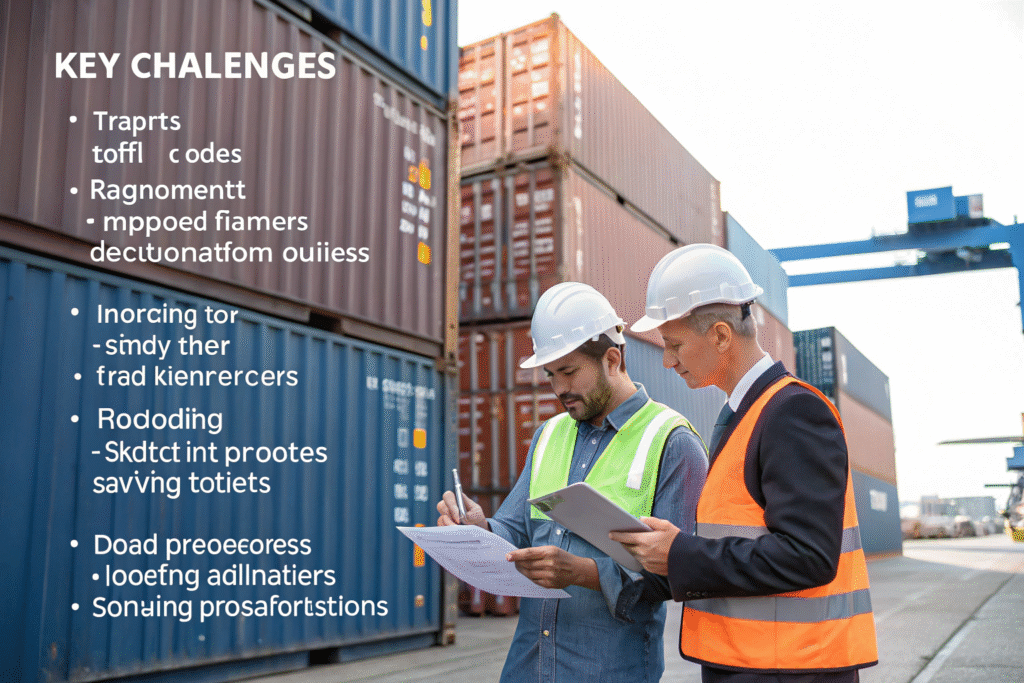
What documents are essential for customs clearance?
You might be wondering which papers customs officers always demand. Documents such as the commercial invoice, packing list, and bill of lading are required almost everywhere. In some cases, countries demand certificates of origin or compliance certificates. Missing or incorrect information can result in penalties. Freight forwarders ensure these forms are accurate and meet international standards. For example, a U.S. importer must follow U.S. Customs and Border Protection guidelines, while European clients must comply with European Commission trade rules.
How do tariff classifications impact costs?
Let’s take a moment to think this through together. Every product is classified under the Harmonized System (HS) code, which determines the tariff rate. A wrong HS code can lead to overpayment or fines. Experienced freight forwarders help clients correctly classify products by consulting resources such as the World Customs Organization and national tariff databases like the U.S. International Trade Commission Tariff Database. This expertise prevents costly mistakes and builds trust with clients.
How Do Freight Forwarders Ensure Compliance?
Clients often ask me how freight forwarders manage to keep up with constantly changing laws. You might be wondering the same thing. The answer lies in compliance systems and strong professional networks.
Freight forwarders ensure compliance by staying updated on regulations, using technology for accuracy, and building relationships with customs officials worldwide. What needs to be emphasized here is that this gives clients confidence that their cargo will not be stopped due to regulatory mistakes.
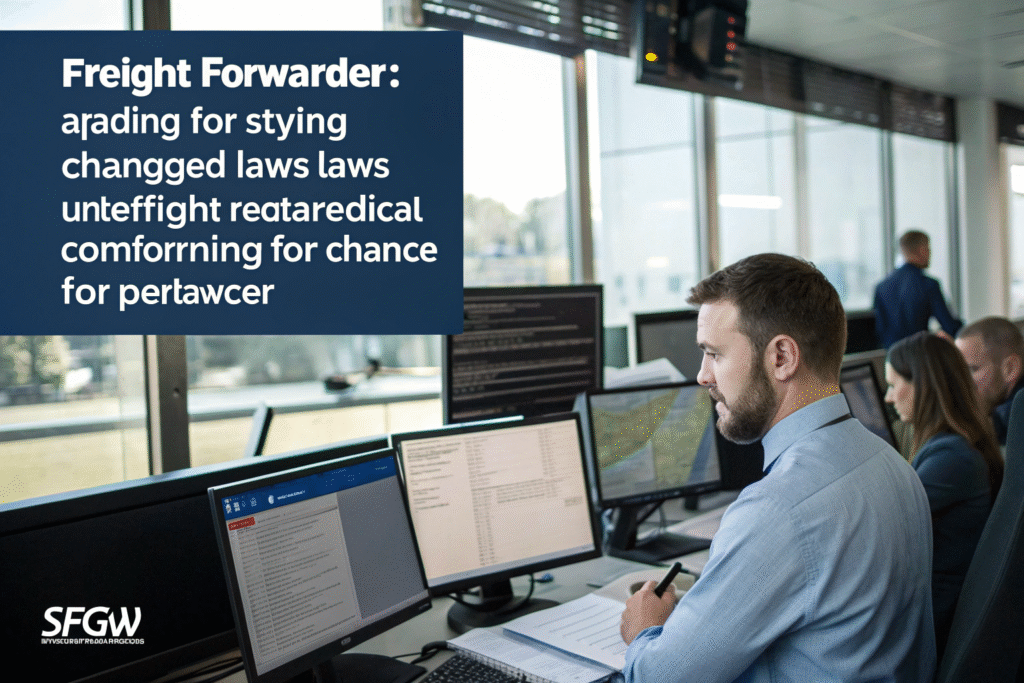
How do forwarders keep up with changing trade laws?
Trade laws shift quickly due to political and economic changes. Let’s think about this together: if you don’t keep track of new tariffs or sanctions, your shipment could be delayed or rejected. Freight forwarders monitor updates through government sites, industry associations, and customs brokers. For instance, International Chamber of Commerce provides guidelines on Incoterms, while the World Trade Organization publishes updates on trade rules. By staying informed, freight forwarders protect clients from sudden changes.
Do technology tools help in compliance checks?
You might be wondering if technology really makes a difference here. The answer is yes. Modern logistics software automates compliance verification. Digital platforms check tariff codes, restricted goods lists, and required licenses. For example, global companies rely on Descartes Systems for customs compliance, while SAP Global Trade Services offers automated workflows. These tools reduce human error and speed up processing times.
Common Mistakes Businesses Make in Cross-Border Shipping
I have seen many companies lose money because they ignored the details of cross-border shipping. You might be tempted to think cutting corners saves money, but most problems come from inexperience or trying to reduce costs without proper planning.
The most common mistakes are incorrect paperwork, underestimating customs duties, and choosing unreliable logistics partners. Let’s take a moment to think this through together: these errors create financial losses and harm business relationships.

Why do incomplete documents cause delays?
What needs to be emphasized here is that customs officials will not release cargo if paperwork is missing. For example, a missing import license can block goods in the port. According to International Trade Administration, documentation errors are one of the top reasons for shipment delays. Partnering with professional forwarders ensures accuracy and reduces risks.
How do hidden tariff costs surprise importers?
You might be wondering why so many importers get caught off guard. Many forget to calculate all customs fees, including VAT, anti-dumping duties, and handling charges. This results in unexpected expenses after goods arrive. To avoid this, freight forwarders consult resources like Global Trade Atlas and provide transparent cost estimates. Businesses that ignore this step often see profits shrink.
Best Practices for Smooth Customs Clearance
While customs regulations are complex, you might be wondering if there are simple strategies to make the process faster and safer. The answer is yes.
The best practices for smooth customs clearance include accurate paperwork, early preparation, and strong collaboration with experienced freight forwarders. What needs to be emphasized here is that clients who follow these practices enjoy consistent delivery times and stable shipping costs.

What role does early preparation play?
Let’s think this through together. When businesses share documents with forwarders before production ends, customs clearance becomes smoother. Forwarders can check tariff codes, licenses, and certificates in advance. For example, Export.gov recommends preparing shipping documentation early to reduce risk. This step avoids last-minute surprises at the port.
How do partnerships improve customs efficiency?
You might be wondering how partnerships really change the process. Working with reliable freight forwarders ensures access to customs brokers, licensed carriers, and international networks. Strong partnerships mean faster resolutions when issues arise. For example, FIATA promotes collaboration between freight forwarders and customs agencies worldwide. By relying on these networks, businesses secure reliable logistics and peace of mind.
Conclusion
Freight forwarders play a vital role in helping businesses navigate cross-border regulations. Let’s take a moment to reflect: without them, shipments risk delays, higher tariffs, and confusion. With them, companies save money, time, and stress.
By handling documents, monitoring trade laws, and building strong customs relationships, freight forwarders like us provide clients with safe, fast, and cost-effective shipping solutions. For business owners in the U.S. and Europe, the best way to succeed in international trade is to partner with experienced forwarders who understand the complexity of customs.
What needs to be emphasized here is that with preparation, transparency, and trust, cross-border shipping becomes a strategic advantage rather than a barrier.
